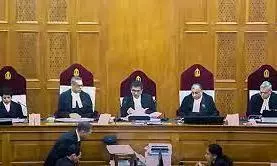
Supreme Court rules out Brexit-like referendum on Article 370, cites constitutional democracy
text_fieldsNew Delhi: The Supreme Court firmly stated on Tuesday that there is no possibility of a Brexit-style referendum concerning the abrogation of Article 370 in Jammu and Kashmir.
The Court, grappling with the constitutional legality of this move, underscored that India is a constitutional democracy, and the expression of the people's will can only occur through established institutions.
The assertion by the five-judge bench, led by Chief Justice DY Chandrachud, was in response to senior advocate Kapil Sibal's assertion that revoking Article 370 – the provision that granted special status to the former state of Jammu and Kashmir – was a political act comparable to Brexit, where the British populace expressed its opinion via a referendum. The Court found this analogy inapplicable to the case of Article 370's repeal on August 5, 2019.
The term "Brexit" gained prominence as the United Kingdom departed from the European Union, driven by factors like growing nationalism, complex immigration matters, and economic challenges.
Kapil Sibal was representing Mohammad Akbar Lone, a National Conference leader who had contested the revocation of Article 370. Sibal argued, "Parliament accorded its approval to the executive act... this court has to decide whether the Union of India could do it."
Sibal has consistently questioned Parliament's authority to annul Article 370 without the presence of the Jammu and Kashmir constituent assembly. He contended that only the constituent assembly, which ceased to exist after 1957, was authorised to recommend the repeal or modification of Article 370. Consequently, he argued, the constitutional provision bestowing special status upon Jammu and Kashmir assumed a permanent nature.
Sibal pointed out, "You cannot divide Madhya Pradesh or Bihar into two union territories. This is a representative form of democracy. In this case, where are the voices of the people of Jammu and Kashmir? Where is the voice of representative democracy? Five years have passed...have you had any form of representative democracy? This way the whole of India can be converted into Union Territories."
During the third day of the hearing on the challenges against the government's decision, Sibal reiterated his stance before the bench, which also comprised Justices Sanjay Kishan Kaul, Sanjiv Khanna, BR Gavai, and Surya Kant. However, Chief Justice Chandrachud remained unconvinced.
"In a constitutional democracy, seeking the opinion of people has to be done through established institutions. So long as a democracy exists as it does, in terms of constitutional democracy, any recourse to the will of the people has to be expressed and sought through established institutions. You cannot, therefore, envisage a situation like Brexit type referendum," Chief Justice Chandrachud countered Sibal's arguments.
Although he acknowledged that Brexit was a political decision, he underscored, "Within a Constitution like us there is no question of referendum."
The hearing is scheduled to continue on Wednesday.





